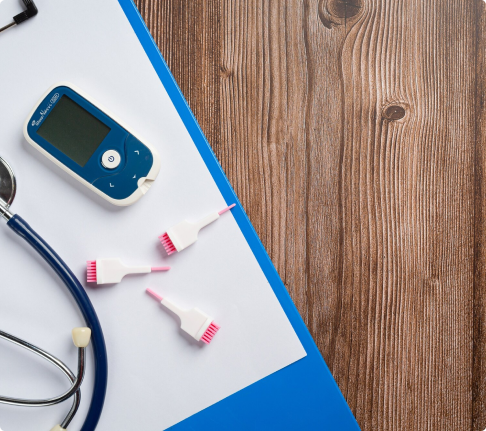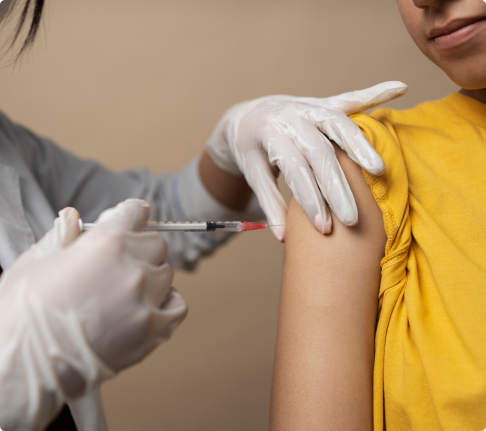- Visiting Hours: Mon-Sat / 8:00 AM - 8:00 PM
- Visiting Hours: Mon-Sat / 8:00 AM - 8:00 PM
- +91 80565 80565 / 044 46878787
Dr SM Rajendran has more than 40 years of experience. He completed his MBBS (1970) and MD (1978) from the University of Madras, and his Doctor of Science (DSc.) in 2012. He taught Internal Medicine and Diabetology at Stanley Medical College and served as Director and Professor of Diabetology at the Sree Balaji Diabetology Research Center, Chennai.
Mon – Sat / 9:00 AM to 1:00 PM
Diabetes refers to a group of diseases that affect the way the human body processes and utilises sugar or glucose.
Sugar is derived from carbohydrates, a primary nutrient or macronutrient in our food, broken down by our body to generate energy and nutrition. Carbohydrates make up a large part of the typical diet and are consumed in the form of rice, wheat, vegetables, or other sweetened foods, which are then broken down into sugar or glucose.
People with diabetes deal with the body’s inability to store and process glucose properly, leading to excessive blood sugar levels. Too much sugar in the blood can lead to a number of health issues; such complications of diabetes include nerve damage, eye disease, cardiovascular issues, and kidney damage.
Diabetes is caused by a number of factors, such as genetics, diet, stress, and lifestyle. Based on these causative factors, the disease is categorised as Type 1 and Type 2. While the typical forms of diabetes are non-reversible, there are some types such as prediabetes and gestational diabetes that can be reversed with the right treatment.
The symptoms of diabetes, or ‘Diabetes mellitus’, as a disease (apart from high blood sugar) vary based on factors such as age, gender, habits, comorbidities, severity and duration of the disease, etc.





As the term suggests, prediabetes is a condition where the blood sugar level is high but not high enough for a person to be diagnosed with diabetes. Prediabetes can thus be considered the early stages of the disease and can be completely reversed in many cases, with corrective measures.
An individual with prediabetes may already be suffering from the long-term effects of diabetes, such as damage to the heart, kidneys, blood vessels, etc. A diagnosis of prediabetes does not always indicate a progression to Type 2 diabetes, but the person does face a higher risk of becoming diabetic.
Prediabetes conditions can be reversed by consuming healthy food, exercising as a part of the daily routine and maintaining a healthy weight and balanced lifestyle to bring blood sugar levels to normal.
For both adults and children, a prediabetic diagnosis is a call to action to change unhealthy habits and prevent adverse progression.



Diabetes is diagnosed as two main subtypes: Type 1 (Diabetes mellitus) and Type 2 (Diabetes insipidus). While many of the signs and symptoms are common between them, the two disease types differ primarily in their cause and treatment outcomes.
Type 1 diabetes is the result of the body’s own defence system attacking the pancreatic cells that secrete insulin, the hormone primarily responsible for processing and storing sugar. This is referred to as an autoimmune reaction. The bodies of those with Type 1 diabetes are unable to produce insulin, and they thus can’t process the sugar consumed, leading to a high blood sugar level and resulting complications.
Type 1 diabetes usually has an early onset and is even seen in childhood or teenage years. The subtype is sometimes genetically inherited, with the disease running in families and usually passed on from parents to children. Children of diabetic individuals face a high chance of having the disease at some point. But with the right precautions and a healthy lifestyle, the disease’s onset can be prevented.
Today, diabetes is on the rise due to high sugar levels in a variety of processed foods we consume. The disease requires treatment throughout a person’s lifetime, with the primary mode being insulin injections taken based on the patient’s sugar levels, weight, and other clinical values.





Type 2 diabetes occurs when the body has trouble processing sugar and using it as an energy source. There are two main causes for this occurrence: the body being unable to produce enough insulin, lifestyle patterns, or a high body weight that can result in disease predisposition. Type 2 diabetes is usually seen in adults, but with the rise in obesity among children, a higher incidence of childhood Type 2 diabetes is being recorded.
Type 2 diabetes is a highly prevalent disease with long-term effects such as cardiac, kidney, and nervous system damage. This subtype too is a long-term disease like Type 1, but it can be controlled by addressing its primary causes such as an unhealthy diet, high body weight, etc. Clinical studies and trials indicate that patients who reduce their body weight, follow the proper diet and exercise have gone into remission and even been able to go off their medication.



Gestational diabetes is a type of diabetes seen only in pregnant women. During pregnancy, the woman’s body undergoes many physical and hormonal changes such as weight gain, hormone fluctuations, increased heart rate, etc. The increase in body weight can disrupt insulin production and also affect how the body cells utilize insulin (This is called insulin resistance).
Only a minority of expectant mothers will develop insulin resistance severe enough to lead to gestational diabetes. A diagnosis indicates a higher risk of increased blood pressure, premature births, developing Type 2 diabetes later in life, and difficulties in delivery.
Gestational diabetes is thus a marker of a high-risk pregnancy, requiring constant medical monitoring. The sugar levels of the expecting mother is tracked periodically throughout the pregnancy to ensure the values stay in the optimum range (less than 140mg/dl).




Prevention is always better than cure. We perform routine physical and wellness check-ups to ensure that any disease is detected and treated in its initial stages.



The symptoms of diabetes vary depending on how high the blood sugar level is. Symptoms may not be constant and, based on the condition’s severity, can be sporadic or increase in intensity. The most common symptoms are:
Apart from these common symptoms, people with diabetes may also experience some atypical symptoms. There is no specific order in which these symptoms appear, though some neurological and kidney symptoms are observed in long-term patients of the disease.



The main cause of diabetes is the abnormal action of the insulin hormone. Insulin is a hormone secreted by specific cells in the pancreas in response to high blood sugar levels. The insulin carries the sugar from the bloodstream and moves it into the body cells, with the hormone level dropping when the level of blood sugar drops to normal. Usually, the blood sugar and insulin levels go up immediately after a meal.





There are several risk factors that can contribute to a diagnosis of diabetes, depending on the disease subtype. For instance, Type 1 diabetes is inherited, and the genetic risk cannot be reduced. But those with parents or close relatives who are diabetic, can take several steps to keep themselves healthy and reduce the risk or progression of the disease.
Here are some of the most common risk factors for diabetes:
Some races and ethnicities are more prone to diabetes, such as Indian, Asian, Black, and Hispanic populations, though the reasons for such higher risk incidence is not clearly understood yet.



The diagnosis of diabetes is done clinically by trained healthcare professionals (diabetologists and Internal medicine specialists) based on a detailed physical examination, recording of the patient’s medical and personal history, and then testing the blood and urine for the disease markers.
In diabetes, two main values obtained from a blood test are clinically relevant to making a diagnosis, namely, blood sugar levels and glycated haemoglobin levels.
Based on the values observed from these blood tests, doctors prescibe the treatment methods and medicine dosages.





The treatment for diabetes depends largely upon the type, duration, disease severity, and environmental and physical factors such as other diseases the person has.
When it comes to treating diabetes, there is no one-size-fits-all approach. The treatment plan is based on the patient’s age, gender, disease profile, weight, diet, and a multitude of other factors and may be changed based on how they are responding to the treatment.
Diabetes is a long-term disease, and the treatment for it is often lifelong. However, modern advancements have made it possible for those with the disease to get treated and manage the disease effectively with minimal disruptions to their daily life.



Would you like to manage your diabetes better and lead a healthier, normal life?
Take an appointment with our senior diabetologist today!


No 6, 6th Main Road, Opp. Indian Bank. Nanganallur, Chennai - 600061
+91 80565 80565 / 044 46878787
contact@dihaclinic.org
Mon - Sat / 8:00 AM - 8:00 PM
 Vishnu Rajan2024-06-03Highly recommended for the services provided here; Excellent ambience; clean and hygienic area where the medical procedures are performed; kind medical and non-medically staffs; Bonus points for the kids-area. Keep up the good work.
Vishnu Rajan2024-06-03Highly recommended for the services provided here; Excellent ambience; clean and hygienic area where the medical procedures are performed; kind medical and non-medically staffs; Bonus points for the kids-area. Keep up the good work. Gopalachari Ramarajan2024-05-31Sir Madam I am very much happy about the hospital check up to my highest satifasfaction Staffs doctors very much responsive well attending needs to the patients more over hospital are well maintained neat n clean the rates for the tests are not high compare to other hospitals.
Gopalachari Ramarajan2024-05-31Sir Madam I am very much happy about the hospital check up to my highest satifasfaction Staffs doctors very much responsive well attending needs to the patients more over hospital are well maintained neat n clean the rates for the tests are not high compare to other hospitals. dharmarajan viswanathan2024-05-25We had a good consultation and advice from Dr.Rajendran. His patient hearing and observation from the file really good. He creates confidence that is what most doctors now don't do it. His approach is so nice. We will recommend this doctor and clinic
dharmarajan viswanathan2024-05-25We had a good consultation and advice from Dr.Rajendran. His patient hearing and observation from the file really good. He creates confidence that is what most doctors now don't do it. His approach is so nice. We will recommend this doctor and clinic Natarajan Subramanian2024-05-16I recently had the pleasure of visiting Sudha ma'am at Diha clinic for my thyroid concerns. From the moment I walked in, the atmosphere was warm and welcoming, which immediately put me at ease. The staff was friendly and efficient, making the entire process seamless. Sudha maam was excellent and she took the time to listen to my concerns and answer all of my questions, never making me feel rushed. Thanks to Dr. Sudha Balasubramnian's guidance and treatment plan, I've seen significant improvements in my thyroid health. Overall, my experience at Diha was exceptional
Natarajan Subramanian2024-05-16I recently had the pleasure of visiting Sudha ma'am at Diha clinic for my thyroid concerns. From the moment I walked in, the atmosphere was warm and welcoming, which immediately put me at ease. The staff was friendly and efficient, making the entire process seamless. Sudha maam was excellent and she took the time to listen to my concerns and answer all of my questions, never making me feel rushed. Thanks to Dr. Sudha Balasubramnian's guidance and treatment plan, I've seen significant improvements in my thyroid health. Overall, my experience at Diha was exceptional Lakshminarasimhan lanhan2024-05-15It is a well maintained clinic with expert doctors in all faculties. The NABL attached pathological lab is managed well by experts in the field. The ambience adds a feel good factor that is sure too assure the patients to get well. The pharmacy attached dispenses all medicines and the patients need not run hither and thither. The front-office personnel are very receptive and assist the patient in the best way they can. Systems are in place, therefore, the prescriptions given are all neatly printed. I pray good health for all through their life, but we are bound to get sick and if such a situation befalls, you can just walk into Diha clinic at Nanganallur for treatment. Stay blessed Stay healthy. Kudos to Team Diha Clinic, Nanganallur, Chennai -600061
Lakshminarasimhan lanhan2024-05-15It is a well maintained clinic with expert doctors in all faculties. The NABL attached pathological lab is managed well by experts in the field. The ambience adds a feel good factor that is sure too assure the patients to get well. The pharmacy attached dispenses all medicines and the patients need not run hither and thither. The front-office personnel are very receptive and assist the patient in the best way they can. Systems are in place, therefore, the prescriptions given are all neatly printed. I pray good health for all through their life, but we are bound to get sick and if such a situation befalls, you can just walk into Diha clinic at Nanganallur for treatment. Stay blessed Stay healthy. Kudos to Team Diha Clinic, Nanganallur, Chennai -600061 Nalini R2024-04-27Dr Sudha is such a friendly person and listens to our problems with patience. Hospital staffs are very polite and easily approachable. Ambience is very good and the rest rooms are maintained in a very hygienic manner. I would recommend Diha clinic for any health concerns.
Nalini R2024-04-27Dr Sudha is such a friendly person and listens to our problems with patience. Hospital staffs are very polite and easily approachable. Ambience is very good and the rest rooms are maintained in a very hygienic manner. I would recommend Diha clinic for any health concerns. google user2024-04-27Excellent facilities, very neatly maintained, and the doctors and clinic staff are very kind and helpful.
google user2024-04-27Excellent facilities, very neatly maintained, and the doctors and clinic staff are very kind and helpful. Balan L S2024-04-22Consulted Dr Niranjanan and his approach, consult and describing medicines are very suitable to us. We are just satisfied with the service of Diha Clinic.
Balan L S2024-04-22Consulted Dr Niranjanan and his approach, consult and describing medicines are very suitable to us. We are just satisfied with the service of Diha Clinic.
No 6, 6th Main Road, Opp.Indian Bank. Nanganallur, Chennai - 600061
Copyright © 2024 Diha Clinic. All rights reserved | Designed by Spidergems